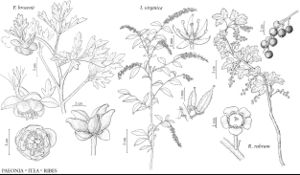Show Lower Taxa
Difference between revisions of "Itea"
Sp. Pl. 1: 199. 1753.
Gen. Pl. ed. 5, 92. 1754 ,.
Common names: Sweetspire
Etymology: Greek itea, willow, alluding to willowlike leaves
FNA>Volume Importer |
imported>Volume Importer |
||
| (One intermediate revision by the same user not shown) | |||
| Line 45: | Line 45: | ||
|publication year=1753; | |publication year=1753; | ||
|special status= | |special status= | ||
| − | |source xml=https:// | + | |source xml=https://bitbucket.org/aafc-mbb/fna-data-curation/src/2e0870ddd59836b60bcf96646a41e87ea5a5943a/coarse_grained_fna_xml/V8/V8_6.xml |
|genus=Itea | |genus=Itea | ||
}}<!-- | }}<!-- | ||
-->[[Category:Treatment]][[Category:Iteaceae]] | -->[[Category:Treatment]][[Category:Iteaceae]] | ||
Latest revision as of 22:44, 5 November 2020
Shrubs without bristles and spines. Leaves: stipules minute, subulate; blade elliptic or obovate, surfaces glabrous or glabrate abaxially, glabrous adaxially, pinnately veined. Inflorescences: bracts subtending pedicels caducous. Flowers: hypanthium cup-shaped; sepals green; petals white; styles connate and grooved at anthesis, distinct in fruit. Capsules 2-locular, longitudinally 2-grooved. x = 11.
Distribution
c, e United States, e Asia, Africa.
Discussion
Species 29 (1 in the flora).
Selected References
None.
